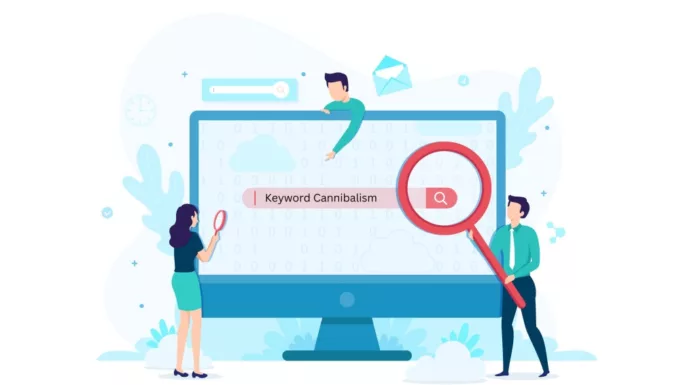SEO is increasingly becoming more complicated as search engines continue to update their algorithms. One of the more subtle SEO strategies that can hurt a website’s ranking is keyword cannibalism, which happens when two or more pages on a website target the same keyword.
SEO optimization often requires careful consideration and a delicate balance of many different factors. When you add keyword cannibalism into the mix, things can get even more complicated as you need to ensure that each page is optimized for unique keywords.
In this article, we will cover the basics of keyword cannibalism and explain why it’s important to avoid it in order to improve your website’s overall SEO.

What is Keyword Cannibalism?
Keyword cannibalism occurs when two or more pages on a website are targeting the same keyword. What this means is that both pages are competing for the same search engine ranking positions and as a result, neither is likely to perform well.
For example, if you have two blog posts on your website that target the keyword ‘SEO optimization’, then the search engines will treat them as one page, diluting their overall effectiveness.
This issue can cause a number of problems for your website’s SEO, including:
- Reduced visibility in search engine rankings.
- Reduced traffic to both pages.
- Poor user experience as the same content is repeated on two different pages.
- Confusing signals are sent to search engines, making it difficult for them to understand your site’s structure and relevance.
Effects of Keyword Cannibalism
First, keyword cannibalism can result in a significant drop in your website’s rankings. This is because when multiple pages target the same keyword, search engines have difficulty determining which page is the most relevant for that keyword. As a result, both pages will be pushed down in the search engine results, leading to reduced visibility for your website overall.
Second, keyword cannibalism can also result in decreased user engagement. When a user searches for a specific keyword and finds multiple pages with the same content, they may be discouraged from staying on your website. This is because the user does not have any incentive to click through multiple pages that contain the same content.
Finally, keyword cannibalism also has a negative effect on your website’s SEO score. The quantity and quality of content determine an SEO score on your website, and keyword cannibalism can lower this score. This is because search engines will penalize websites with duplicate or near-duplicate content, resulting in a lower overall SEO score.

Identifying Keyword Cannibalism
Finding keyword cannibalism on your website can be a challenge. It is important to first get an idea of the structure of your website and where keywords might be present. This will help you determine which pages may have similar content that could potentially cause keyword cannibalism.
Once you are aware of potential sources of keyword cannibalism, it is important to use keyword research tools to identify which keywords are being used on each page. This will allow you to compare the keyword usage across different pages and determine if there is any overlap in terms of your target keywords.
Comparing keyword rankings
This can also be beneficial in detecting keyword cannibalism. Comparing keyword rankings across your website pages using a keyword ranking tool can help you determine which pages compete for the same keywords. If two pages have similar rankings, it may be necessary to adjust the content of one page or both in order to avoid cannibalizing traffic from each other.
If you notice that one of your pages is outranking the other, it is possible that the stronger page is using a more effective keyword strategy and should be promoted more aggressively.
For example, if you are trying to rank well for a particular keyword, it would be best to create content specifically around that keyword. If you have multiple pages on your website targeting the same keyword, you will find that one page is likely to dominate in the rankings over the other. In this case, it may be necessary to revise or delete content from the weaker
If you believe there is a problem with keyword cannibalism on your website, it is important to take action quickly. You can use a tool like Moz’s SERP Analysis to compare the keyword rankings of different pages and determine if there is an issue.
Not only is it important to understand and identify potential sources of keyword cannibalization, but it’s also essential to take action as soon as possible. The longer you allow keyword cannibalism to exist on your site, the harder it will be to recover from any drops in organic search traffic.
Analyzing Backlinks
To identify cannibalization issues, you need to look at the backlinks of your website. Backlinks are one of the major Google ranking factors and are used by search engines to determine the credibility and relevance of a page or website. If you have pages with similar backlink profiles, it indicates that they’re competing for the same keyword rankings in SERPs.
You can analyze your backlinks using a number of tools like Majestic, Moz, Ahrefs, and others. These tools will provide you with an in-depth look into the types of links pointing to each page. This allows you to identify any overlap between pages as well as any off-page SEO issues that could be negatively impacting your rankings.
For example, if you find that two pages have identical anchor text ratios and link profiles, it could indicate that one of the pages is a duplicate or near-duplicate of the other. In this case, search engines may only display one of these pages in SERPs, which can cause your rankings to suffer.
Content Audit
One of the most effective keyword cannibalism-identifying methods is a content audit. This involves analyzing your website’s pages for keyword overlap, duplicate content, and low-value topics that could be competing with other pages on the same website.
You can do this manually by going through each of your web pages and analyzing the content for similarities or common threads. Generally speaking, you should be looking for anything related to ideas, concepts, and topics. You can also use software tools such as Screaming Frog or Botify to automate the process and quickly identify any potential keyword cannibalization issues.
By doing this, you’ll be able to see which pages are competing with each other and make adjustments to their content accordingly. This will help not only to ensure that each page is optimized for its own keyword but also to safeguard against any potential value-related issues. Additionally, you’ll be able to better understand how the content on your website can be best used as part of an effective overall SEO strategy.
For example, if you find that multiple pages are targeting the same keyword, you might want to consider combining them into one page or redirecting them to a single targeted page. Alternatively, you can create more specific content for each page so that it is optimized for its own unique keyword and does not compete with other pages on your website. This will help ensure that every page on your website is properly optimized and receives its fair share of organic traffic.
Analyzing metrics
Analyzing metrics such as page visits, bounce rate, and time on page can also help to determine which pages should be further optimized for keywords. In addition to keyword cannibalization, this type of analysis can be used to identify other areas of improvement such as improving page titles or meta descriptions.
Finally, using tools like Google Search Console can help you spot any issues with the content on your website in terms of indexability. If you’re not sure how to use Google Search Console, there are plenty of tutorials available online that can help you get started.
By using all these methods and tools together, you’ll be able to ensure that every page on your website is optimized for search engines and that no content is being wasted or overlooked. You’ll also be able to identify any areas of improvement, as well as highlight any issues that are causing your website to suffer in terms of search engine rankings. This will enable you to make the most out of your content and ensure that your website is performing its best for maximum visibility and success.
Conclusion
In essence, with Google’s recent updates, keyword cannibalization is something that website owners must be aware of and take the steps to address. Though it can seem quite complicated, the process is actually quite simple when you break it down into its core components – researching keywords, analyzing content performance, identifying keyword cannibalization opportunities, optimizing pages, and monitoring your progress.
If you need help with addressing these steps, you can take the help of an SEO company that can show you through the process and makes sure that your business should understand the importance of keyword cannibalization and take the necessary steps to ensure their web-based business is performing its best for maximum visibility and success.


